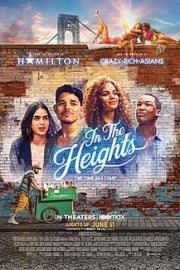In the Heights
I’m not quite sure when it was when movie musicals decided they needed to try to be “realistic” in their settings (maybe “Rent?”), but one of the things I appreciate the most about “In the Heights” is that some of the fantasy spectacle the old school musicals had feels back as it unfolds. It begins with Usnavi de la Vega (Anthony Ramos), the main character of the film, regaling children about the story of Washington Heights, a Latinx-populated are of New York City where he ran a bodega, as he’s on a beach, in front of a drink stand his father used to run in the Dominican Republic. That sets up “In the Heights” as a fable, and it’s the first of many breaths of fresh air Jon M. Chu’s film has in store for the audience.
Just because “In the Heights” strikes us as a fable doesn’t mean there isn’t some serious ideas at the heart of this musical by Lin Manuel-Miranda and Quiara Alegría Hudes (the latter of whom wrote the screenplay). “In the Heights” is about Dreamers- immigrants whose families has brought them to America for better lives- and the dreams they have, and the system that makes it a struggle for both the people, and their hopes, to succeed. Prejudice, systemic oppression, the American immigration system and financial struggles are all big players in the fates of many of these characters, and how they view their stories. But the film isn’t about pain but joy, of what inspires us, and that’s why I makes an impression.
The film begins with Usnavi, and during the first song, “In the Heights,” we come to to meet many of the other characters in the story. Usnavi has feelings for Vanessa (Melissa Barrera)- who works at a salon run by Daniela (Daphne Rubin-Vega), but wants to be a fashion designer- and runs the bodega with his cousin, Sonny (Gregory Diaz IV). Benny (Corey Hawkins) works at a taxi service owned by Kevin (Jimmy Smits)- whose daughter, Nina (Leslie Grace), comes home from Stanford, and whom Benny has feelings for. At the heart of the community is Abuela (Olga Merediz), who never had children of her own, but is the mother (or grandmother) figure of everyone in the film. As with “Rent,” there are narrative threads we follow, but ultimately, this is about the lives of the characters, and how they struggle, and how they succeed.
As much as it is about dreams, and Dreamers, it’s also about figuring out what home means to the characters. If you’ve been displaced from your life because of opportunities your parents saw that might be beneficial to you, it throws your sense of what home can mean out of whack, especially if it feels as though you’re being asked to follow a specific path by your parents. When my parents moved us to Georgia in 1988, it wasn’t just because of a job for my dad, but because the opportunities it might have for me growing up; it took a while for me to figure that out, and to realize that, at a certain point, you have to figure out your own path in life. Because of that personal experience, Nina’s arc- which involves that tension of doing what her father wants vs. what she wants, and finding a middle ground- was probably the most personally affecting for me, but God knows I’ve been Usnavi at times; Hell, I still am, dreaming of what I want to do, as well as realizing that what’s right in front of me is also where I need to be. That’s a balance this story looks at as well as any movie I’ve seen.
The songs in “In the Heights” don’t feel as instantly memorable (for me, at least) as, say, “Rent” or “Hamilton,” but listening to them again as I’m working on this review, it won’t be the last time I listen to them. Chu does a fine- and sometimes, better than fine- job staging the musical sequences (“Paciencia y Fe” is the immediate all-timer, but “In the Heights” balances tone and exposition well, “When You’re Home” is a strong song between Nina and Benny, and “Carnaval del Barrio” gets us out of our emotional doldrums as much as it does for the characters), and the performances are very good. It goes on a bit long at just under 2 1/2 hours, but “In the Heights” is a winner for me because of what, emotionally, it’s doing. This is what a good musical should be.










